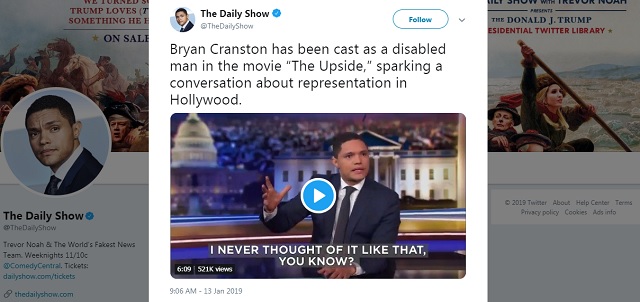
 This is what passes for a comedy show in 2019. This is what passes for a comedy show in 2019.
Via Slate:
Noah made that observation about the state of the internet while discussing a recent casting controversy: In The Upside, a remake of the French film The Intouchables, Bryan Cranston plays a man who is paralyzed below the neck and uses a wheelchair. Advocates have criticized Cranston—as they have other actors in the past—for playing a disabled character that could have gone to a disabled actor. According to Sky News, Cranston acknowledged “the need to expand the opportunities for people with disabilities” but defended taking the role, comparing it to playing a gay character as a straight man or a poor character as a wealthy person. “I don’t know, where does the restriction apply, where is the line for that?” he asked. “I think it is worthy for debate to discuss those issues.”
Noah tackled the controversy on the set of The Daily Show, speaking more casually to the audience than he normally would in a formal, scripted segment. “I’m not gonna lie, my first instinct—because I love Bryan Cranston—my first instinct was like, are you being serious?” he said. “C’mon, man. We’re going too far now. You can’t—like, they’re actors. Actors are gonna act. If we get everyone who is the thing to be the thing, then it’s not acting, then it’s just the thing, it’s a documentary.” But then, Noah explained that, in a rare moment of online civility, he read something that changed his mind, written by a wheelchair-using actor whom Noah did not name.
Here’s how Noah tells it:
He just wrote a really cogent, beautiful response online. Didn’t fight with anybody, didn’t call anybody anything, didn’t judge anybody. And he completely opened my eyes to a perspective I never thought of. He said, “I understand what an actor is. I, too, am an actor. But I’m an actor in a wheelchair, and I never see parts that are leading roles for a person in a wheelchair. And so the one time I see a role where there’s a person in a wheelchair, I think, wow, this could be it. This could be the moment where I have all of the tools necessary to play this part. Do I get a shot at playing it?” And he was like, “Because when you think of it on the flip side, they never call people with wheelchairs in to play able-bodied people, and they’ll get able-bodied people to play people in wheelchairs.”
I never thought of it like that. My perspective, obviously, as someone who is not in a wheelchair—I just never thought of it that way. And I sat there and I was like, it’s powerful because you don’t think about representation, you don’t think about how important it is for people to see themselves onscreen in a real way. And at the same time, I don’t think Bryan Cranston did anything wrong. I don’t think everything has to be a fight. It’s just, like, a moment to be like, hey, maybe next time people in Hollywood can look at that and go, maybe you can get a relatively unknown actor to play that role and then put an A-lister opposite them and maybe this becomes their breakout. Maybe this becomes the thing that blows them up.
And that’s where you realize how powerful representation is, because if you’re a person in a wheelchair, how many movies come along where the lead character is in a wheelchair? There’s virtually none. And even myself, I was like, oh man, I have to try and understand that a little bit more. It was eye-opening.
Rather than spend some of the millions he's got from shilling for the establishment to help a disabled actor get "representation," Noah just dropped $20 million on a house in the gated community of Bel Air.
Now that is funny!
Follow InformationLiberation on Twitter, Facebook, Gab and Minds.
|






 This is what passes for a comedy show in 2019.
This is what passes for a comedy show in 2019.


